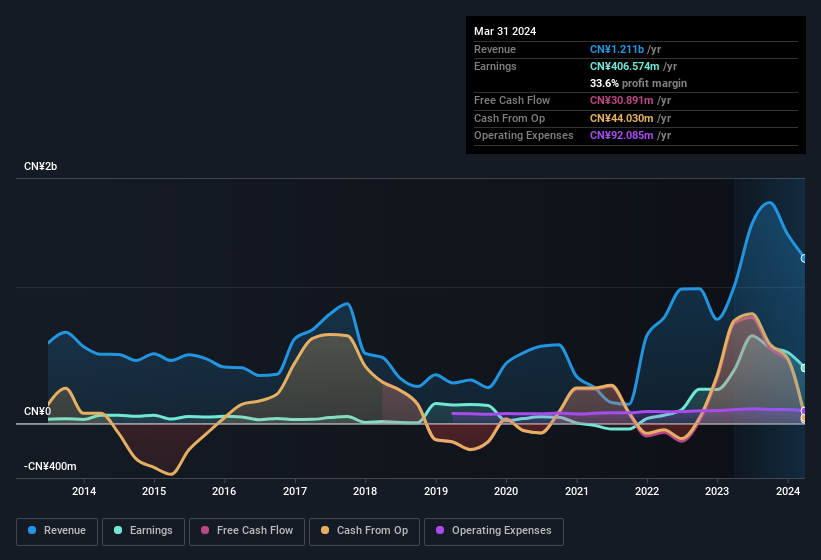- China
- /
- Real Estate
- /
- SZSE:000014
We Think That There Are Some Issues For Shahe Industrial (SZSE:000014) Beyond Its Promising Earnings

Shahe Industrial Co., Ltd. (SZSE:000014) just released a solid earnings report, and the stock displayed some strength. However, we think that shareholders should be cautious as we found some worrying factors underlying the profit.
View our latest analysis for Shahe Industrial

Zooming In On Shahe Industrial's Earnings
As finance nerds would already know, the accrual ratio from cashflow is a key measure for assessing how well a company's free cash flow (FCF) matches its profit. To get the accrual ratio we first subtract FCF from profit for a period, and then divide that number by the average operating assets for the period. This ratio tells us how much of a company's profit is not backed by free cashflow.
That means a negative accrual ratio is a good thing, because it shows that the company is bringing in more free cash flow than its profit would suggest. While it's not a problem to have a positive accrual ratio, indicating a certain level of non-cash profits, a high accrual ratio is arguably a bad thing, because it indicates paper profits are not matched by cash flow. To quote a 2014 paper by Lewellen and Resutek, "firms with higher accruals tend to be less profitable in the future".
Shahe Industrial has an accrual ratio of 0.43 for the year to March 2024. Ergo, its free cash flow is significantly weaker than its profit. As a general rule, that bodes poorly for future profitability. To wit, it produced free cash flow of CN¥31m during the period, falling well short of its reported profit of CN¥406.6m. Shahe Industrial's free cash flow actually declined over the last year, but it may bounce back next year, since free cash flow is often more volatile than accounting profits. The good news for shareholders is that Shahe Industrial's accrual ratio was much better last year, so this year's poor reading might simply be a case of a short term mismatch between profit and FCF. Shareholders should look for improved cashflow relative to profit in the current year, if that is indeed the case.
Note: we always recommend investors check balance sheet strength. Click here to be taken to our balance sheet analysis of Shahe Industrial.
Our Take On Shahe Industrial's Profit Performance
As we discussed above, we think Shahe Industrial's earnings were not supported by free cash flow, which might concern some investors. For this reason, we think that Shahe Industrial's statutory profits may be a bad guide to its underlying earnings power, and might give investors an overly positive impression of the company. The good news is that its earnings per share increased slightly in the last year. Of course, we've only just scratched the surface when it comes to analysing its earnings; one could also consider margins, forecast growth, and return on investment, among other factors. In light of this, if you'd like to do more analysis on the company, it's vital to be informed of the risks involved. Case in point: We've spotted 2 warning signs for Shahe Industrial you should be mindful of and 1 of them is a bit concerning.
Today we've zoomed in on a single data point to better understand the nature of Shahe Industrial's profit. But there is always more to discover if you are capable of focussing your mind on minutiae. Some people consider a high return on equity to be a good sign of a quality business. While it might take a little research on your behalf, you may find this free collection of companies boasting high return on equity, or this list of stocks that insiders are buying to be useful.
New: Manage All Your Stock Portfolios in One Place
We've created the ultimate portfolio companion for stock investors, and it's free.
• Connect an unlimited number of Portfolios and see your total in one currency
• Be alerted to new Warning Signs or Risks via email or mobile
• Track the Fair Value of your stocks
Have feedback on this article? Concerned about the content? Get in touch with us directly. Alternatively, email editorial-team (at) simplywallst.com.
This article by Simply Wall St is general in nature. We provide commentary based on historical data and analyst forecasts only using an unbiased methodology and our articles are not intended to be financial advice. It does not constitute a recommendation to buy or sell any stock, and does not take account of your objectives, or your financial situation. We aim to bring you long-term focused analysis driven by fundamental data. Note that our analysis may not factor in the latest price-sensitive company announcements or qualitative material. Simply Wall St has no position in any stocks mentioned.
About SZSE:000014
Shahe Industrial
Develops, operates, and manages real estate properties in China.
Flawless balance sheet with weak fundamentals.
Similar Companies
Market Insights
Community Narratives





